Asuncion Arnedo’s “Spanish for the Health Professions” Embodies Liberal Arts and Experiential Learning with Keystone Health and their Agricultural Worker Program Partnership
By Rebecca Agababian '21, CCLA Student Leader
Upon first viewing the listing for the class “Spanish for Health Professions,” the course’s description is like that of most classes in Dickinson’s catalog: a few required pre-requisite classes, the departments it is cross listed with, and a brief class description. However, the description’s last line immediately separates this class from many others at the college: “Off-campus volunteer work with native Spanish speakers is required.”
The class connects with local migrant workers in Franklin, Adams, and Cumberland County to serve as interpreters for health care workers who go into the migrant camps to provide basic health care and assess the needs for further treatment. When needed, vans bring migrants and their families to the clilnic. Those who went to the migrant neighborhoods primarily addressed pre-registering clients for the health center, helped conduct blood pressure and blood sugar tests, and asked about pain. Students who volunteered at the clinic mainly interpreted for clients while they were in their appointments.
This tangible experience, an integral component to the experiential learning that Dickinson values, is what has made “Spanish for the Health Professions” special since former Dickinson Professor of Spanish Wendell Smith started the partnership between the college and Keystone Health in 2005.
The class and its partnership has since been taken over by Lecturer in Spanish Asuncion Arnedo-Aldrich. “When I came into teaching this class, I already had that connection,” said Arnedo. “I just expanded to a different way of teaching it.”
Ryan Murphy ’20 took the class in the fall of 2019 when he was a senior applying to medical school. He mainly volunteered at the clinic itself. “It was a perfect blend of my interests with medicine and with Spanish, and I really enjoyed my classes in the Spanish department, and I just knew I had to take this class,” said Murphy, who is currently in his first year at the Penn State College of Medicine. Murphy has continued to hone his translation skills at Penn State with student groups like the university’s Medical Spanish Interest group, in which students practice medical interpretation in Spanish.
One of the ways Arnedo has helped to meet the needs of the migrants outside of their working conditions is by organizing and distributing Welcome Care Packages or "Healthy Packages,” as she calls them, to the workers. These kits contain essentials like flip-flops, calamine lotion, toothbrushes, ibuprofen, and sunscreen, among other items.
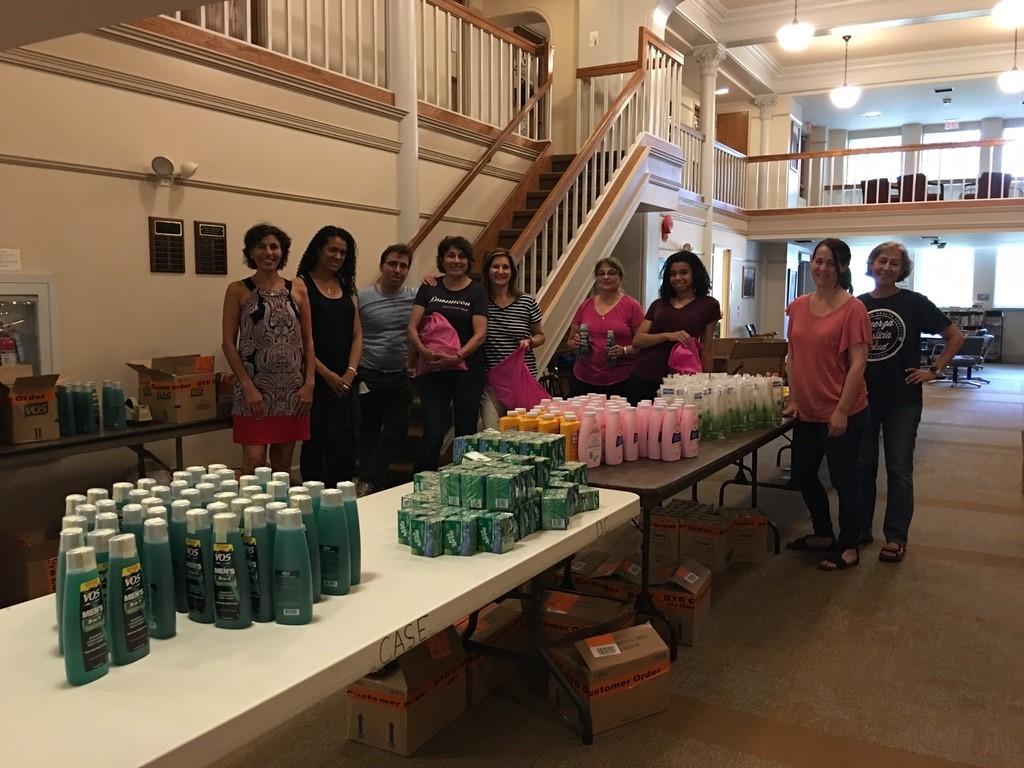
Departmental and community members putting together the healthy packages for the migrant workers during the summer of 2018.
“When these students have something to bring, it breaks the ice that sometimes is there, because you don't know this person, they don't know you don't know if you're going with good intentions or not because raids have been in these camps and ICE [Immigration and Customs Enforcement] has come in before,” said Arnedo.
The bags were first funded from a grant from the Partnership for Better Health in Carlisle. Most recently, however, Arnedo has successfully secured a grant from the Andrew W. Mellon foundation for the past two years, which has allowed her to further supplement the bags.
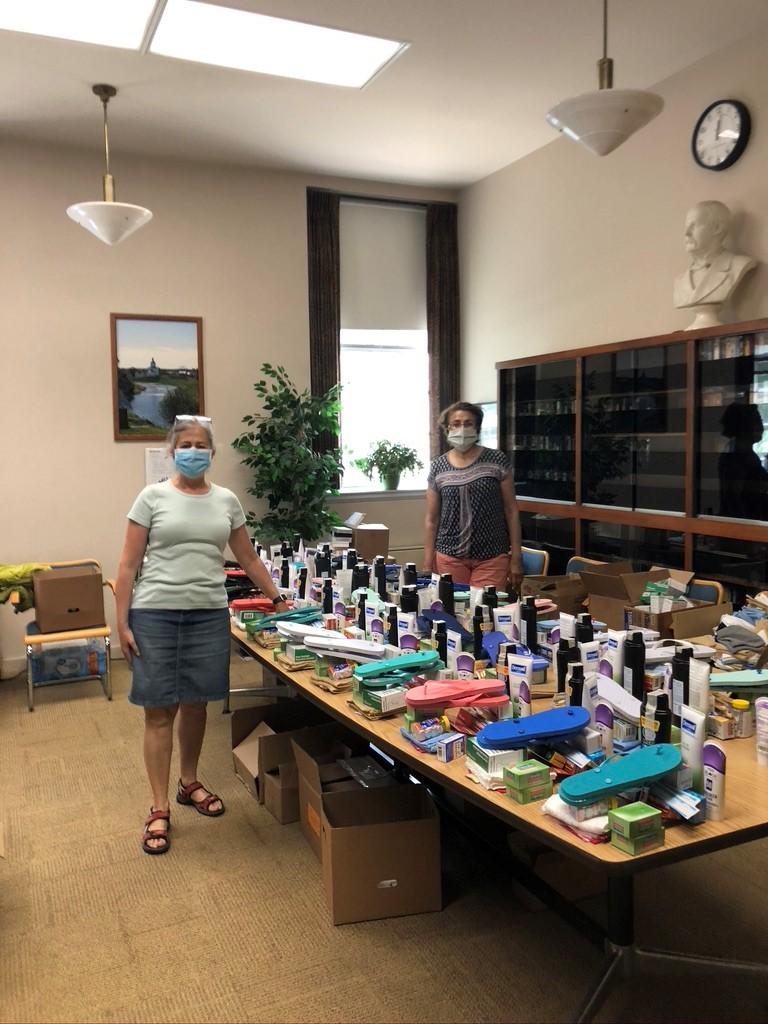
Liz Zizzi and Asunción Arnedo during the spring of 2020 preparing healthy packages for summer and fall distribution to workers in their neighborhoods.
“It’s the little tiny things like we don't have to break open a box of at band aids and put some in a Ziploc bag for this person; everybody gets their own box,” said Liz Zizzi, senior coordinator for the Spanish, Portuguese, and Russian departments, who has assisted Arnedo in ordering the products and assembling the care packages. “That saves us work and they benefit from it too. But she [Arnedo] told me that when she hands these bags out and explains what's in them, with her students, they appreciate the effort.
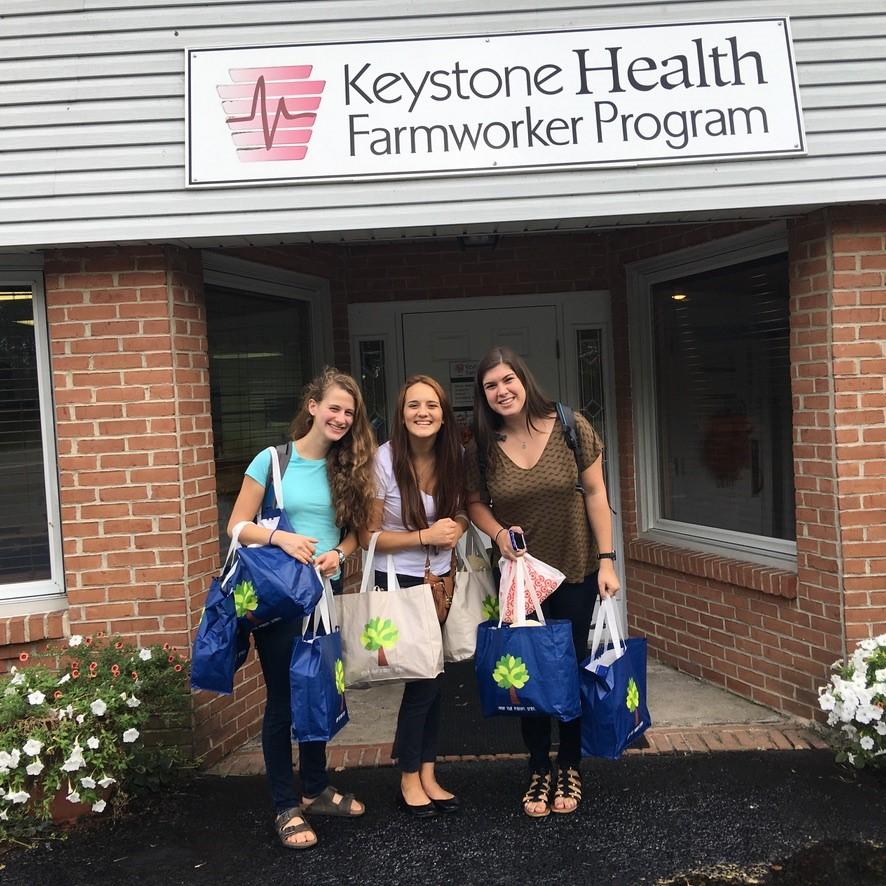
(from left to right) Julia Pearl-Schwartz, Monica Thapa ‘17 and Layla Budin ‘17 at the entrance to the Keystone Health clinic in Fall 2016.
Kristen Kozar ’20, took the class during the fall of her junior year. Kozar noted that one of the many unique aspects about the class was the many different backgrounds that students brought to it. “I think everyone in the class came to it with some sort of lens,” said Kozar. “And one thing just in general about civic learning classes at Dickinson, because I've taken some others that I think is really interesting, is it really brings out the Dickinson liberal arts environment where I think there's some of the most interdisciplinary classes on campus. And it really brings a wide array of people to the table.”
Along with the medical setting of the class, Kozar noted how the experience also pertained to her certificate in food studies that she completed at Dickinson. “I approached it from an agricultural perspective and learning more about what the food scope looked like in the greater Cumberland County area and the class, more so takes place in Adams County, which neighbors Carlisle,” said Kozar.
After a friend convinced her to take the class, Maddie DuBoyce ’20 found agricultural connections in her experience during the fall of 2019. “It helps you get more in touch with your relationship to food when you're really seeing the people who are picking these apples and stuff that you see in the caf, for example,” said DuBoyce. DuBoyce is now a Farm Educator and Outreach Coordinator at the Dickinson College Farm.
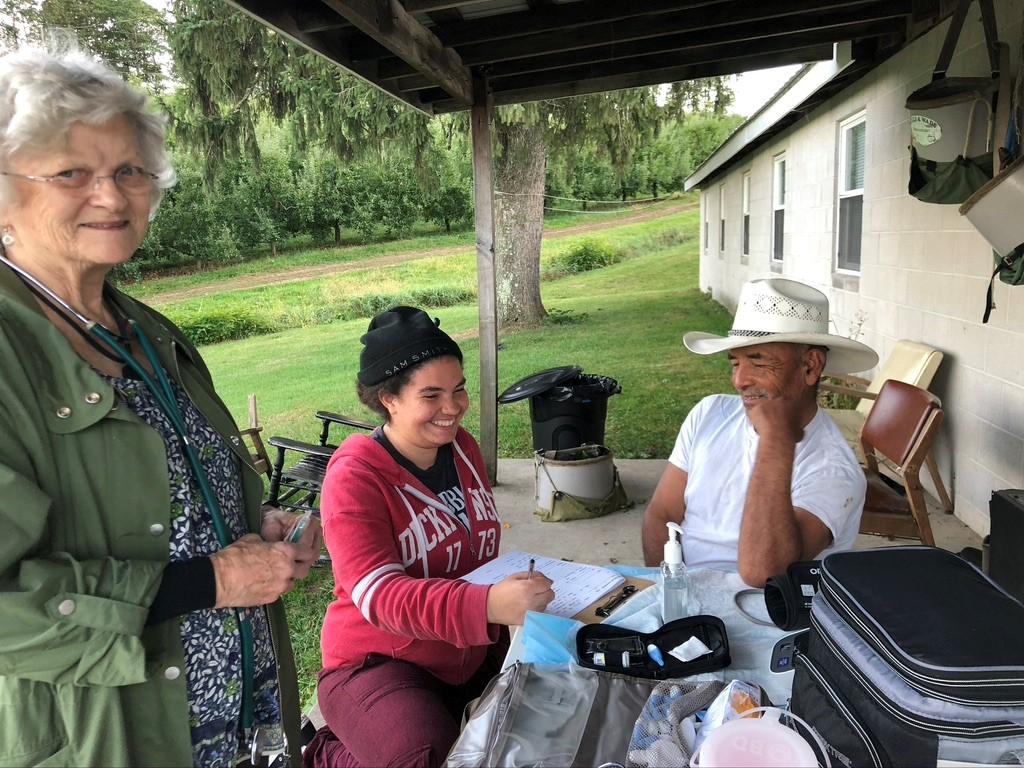
Maddie DuBoyce ‘20, center, in Fall 2019 with Keystone Health nurse Linda Noble, left, and a migrant worker, right.
Meanwhile, Murphy approached the class from a patient care and healthcare perspective. “Sometimes I would translate for them as [the migrant workers] were in the appointment speaking to the doctor, sometimes I would translate with nurses as they were getting blood drawn for example.”
The migrants’ working conditions was another takeaway for students.
“There is a huge variety of conditions. Some places were pretty nice and it was just three people living there, and other places it was way more packed and a lot less sanitary” said DuBoyce.
Kozar particularly noticed the disparities in working conditions when visiting different farms. “We went to a farm with principally Haitian workers and you could tell that because of that, the staff there wasn't taking good care of them as they should have been. And we saw a lot more vulnerabilities with the workers, like bigger issues with back pain and pesticides under their nails, things like that,” said Kozar.
“The class opened my eyes to the politics behind not only our healthcare system, but also our food system. Immigration was also heavily discussed in the class and we learned how closely linked immigration is to both healthcare and the food system.” said Murphy.
When Dickinson went virtual for the fall of 2020, Arnedo continued to work with Keystone as an Outreach Coordinator and Interpreter. She then connected students with workers by providing phones to those migrants who volunteered to interact with students. Students would then call the workers to exchange information for the Spanish class and, in some cases, provide them with English classes facilitated by the Northwest Tri-County Intermediate Unit 5, and their local educational center.
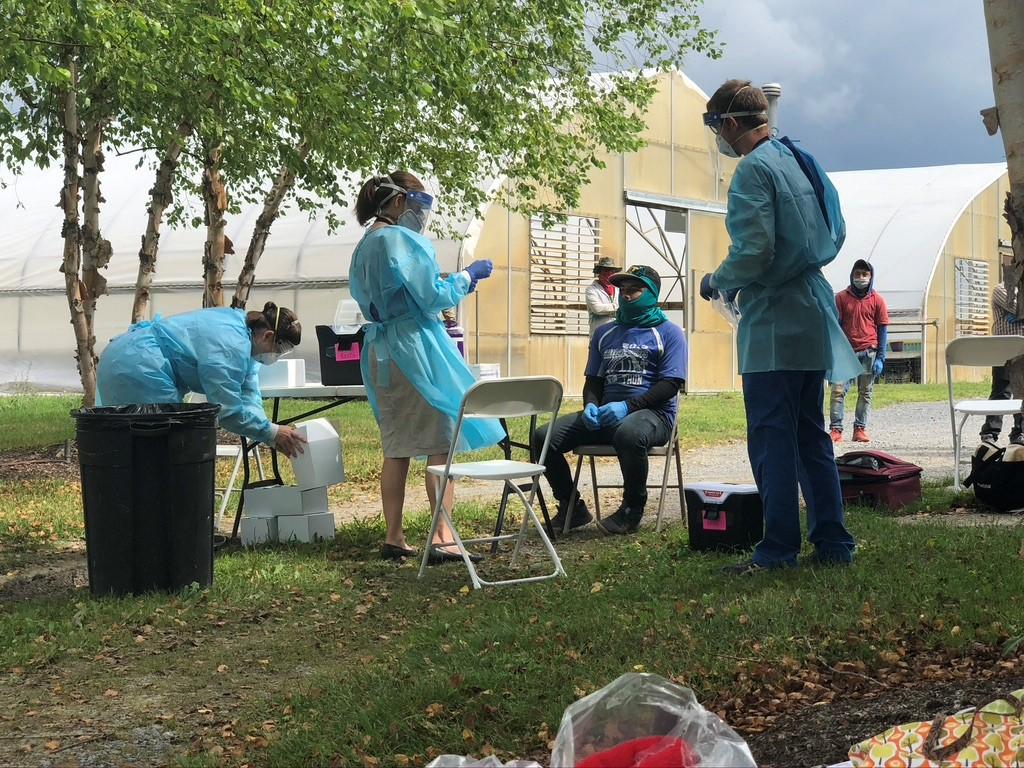
The Keystone Outreach team getting ready to test for COVID-19 and register workers for the Keystone Agricultural Worker program in Franklin County during the summer of 2020.
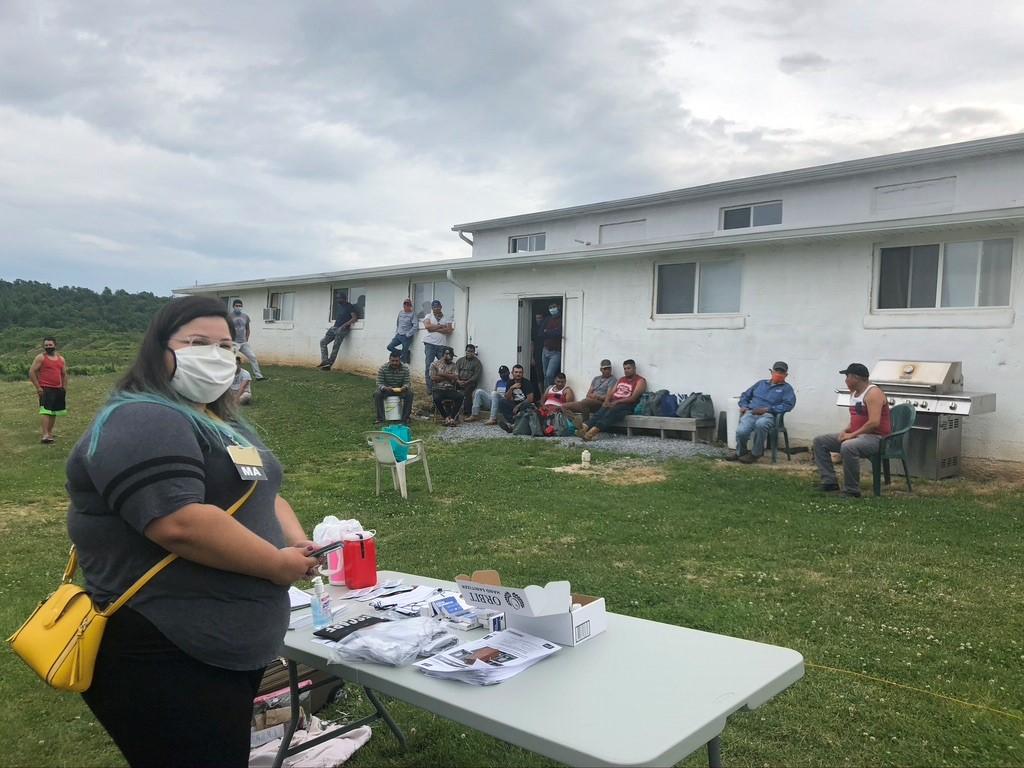
Keystone Outreach team member Tania Alvarez in Adams County with migrant workers after work in Fall 2020.
Overall, students finish the class every December with a new perspective on the country’s food and healthcare system and the role their knowledge of Spanish can have in it.
“It was a positive experience, but it just showed me a lot of parts of healthcare that I don't think are really obvious to a lot of people,” said Murphy. “And that was a very good experience for me as a kind of mentor and medical training.”
“I think it's one of the best classes at Dickinson, and it was a great opportunity.” said Kozar.
“It was like an eye-opening experience about where your food comes from,” said DuBoyce. “A different perspective that I think is super important for everyone to know.”